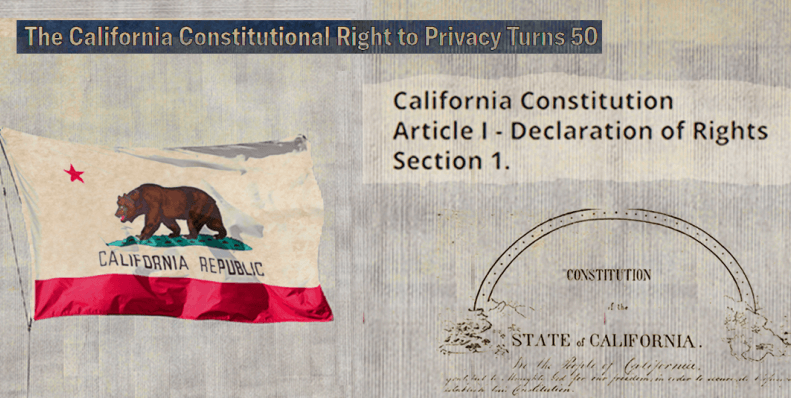

Life, liberty, and privacy. These inalienable rights are enshrined in Article I, Section 1 of the California Constitution. In 1972, with support from the ACLU in California, a modern constitutional right to privacy was added to the state constitution through a prescient ballot measure. And for the last five decades, it has helped safeguard our homes, our families, our bodies, our thoughts, and our associations from invasion by government and corporate interests.
Article I, Section 1 of the California Constitution applies to both government and private entities. It was specifically designed to preserve our private lives and fundamental rights in the face of technological advances. Indeed, in drafting the ballot measure, the authors were explicit that the measure's “moving force” was to protect against the “modern threat to personal privacy.” The ballot measure also clarified that the inalienable rights listed in Article I, Section 1, applied to everyone, replacing the word, “men,” with “people.”
For fifty years, California's right to privacy has been a north-star for our work on cutting edge laws—from consumer protections that require businesses to provide people with privacy policies, data-breach notifications, and the right to know about and delete the information being collected on them—to anti-surveillance laws that require the government get a warrant to access our personal information and that protect against face surveillance and other dangerous technology. It has also been vital in landmark litigation to protect personal privacy, free speech, and bodily autonomy.
Today, Article I, Section 1 is more important than ever. In a digital world, our freedom depends on our ability to control how our personal information is collected and used. Privacy rights have also become even more salient given recent U.S. Supreme Court decisions and the passage of anti-abortion and anti-LGBTQ laws in many states. Now is the time to make sure the promise of the California constitutional right to privacy becomes a lived reality.
Article I, Section 1: Major CasesSince its adoption, California's constitutional right to privacy has been used in the court to protect abortion rights, stop the government from infiltrating and spying on activists, challenge indiscriminate body searches, and protect LGBTQ youth, among other cases. The ACLU in California has led much of this litigation.
White v. Davis: The California Supreme Court ruled that the Los Angeles Police Department violated Article I, Section 1 of the Californian Constitution when they infiltrated UCLA courses and organizations to create dossiers on students and professors, without any suspicion of illegal activity. The Court wrote that the LAPD’s spying program “epitomizes the kind of governmental conduct which the new constitutional amendment [Article I, Section 1] condemns."
Sheehan v. San Francisco 49ers: The California Supreme Court ruled that people who choose to go to an entertainment event do not consent "to any security measures the promoters may choose to impose no matter how intrusive or unnecessary." The issue in question was a policy by the 49ers that required all ticket holders submit to indiscriminate body pat-downs to gain admittance to games.
Comm. to Defend Reproductive Rights v. Myers: The California Supreme Court invalidated state laws that refused to the pay medical expenses of poor women who chose to have an abortion. In their decision, the court wrote: "By virtue of the explicit protection afforded an individual's inalienable right of privacy by Article I, Section 1 of the California Constitution. the decision whether to bear a child or to have an abortion is so private and so intimate that each woman in this state -- rich or poor -- is guaranteed the constitutional right to make that decision as an individual, uncoerced by governmental intrusion."
Planned Parenthood Golden Gate v. Superior Court: The California Court of Appeal, First District, ruled that Article I, Section 1, protected the privacy of staff and volunteers at Planned Parenthood, and that the organization was not required to disclose the identities, phone numbers, and addresses of staff and volunteers during discovery.
Nguon v. Wolf: Charlene Nguon, 17, was a senior at Santiago High School in Orange County, California, when school officials outed her to her family without her permission for dating a girl. The United States District Court for the Central District of California issued a ruling that students have a protected privacy right under the California Constitution and they do not waive their reasonable expectation of privacy simply because they are out in one context, but not in another.
The Future of Article I, Section 1: Privacy in the Digital AgeBerkeley Law Symposium - California Constitutional Privacy at 50: Power of State Law and Promoting Racial Justice in the Digital Age
Over 200 leading academics and practitioners came together on October 27, 2023 for a historic symposium exploring the landscape of California’s constitutional right to privacy at age 50, highlighting how the right is currently used to promote racial justice and other social progress, and discussing new creative and intersectional uses of state constitutional rights to privacy to defend and promote justice in the digital age.
The ACLU of Northern California Technology and Civil Liberties Program was pleased to help the Berkeley Technology Law Journal organize this important event.
Complementary blogs and articles are online now, including:
Recordings from the full day of panels are available at:
The following are the publicly available materials from the California State Archives related to the passage of Assembly Constitutional Amendment 51 (ACA 51) in 1972. The passage of ACA 51 by a 2/3 majority of the California legislature placed the constitutional right to privacy on the ballot as Proposition 11 in the November 1972 election.
Proposition 11 was passed by the California voters in 1972 by a substantial majority - 62.9% of the vote. With its passage, California became the first constitution in the nation – either federal or state – to include an explicit right to privacy.
The following are archived materials from the ACLU of Northern California related to work on the California constitutional right to privacy.
More reading: